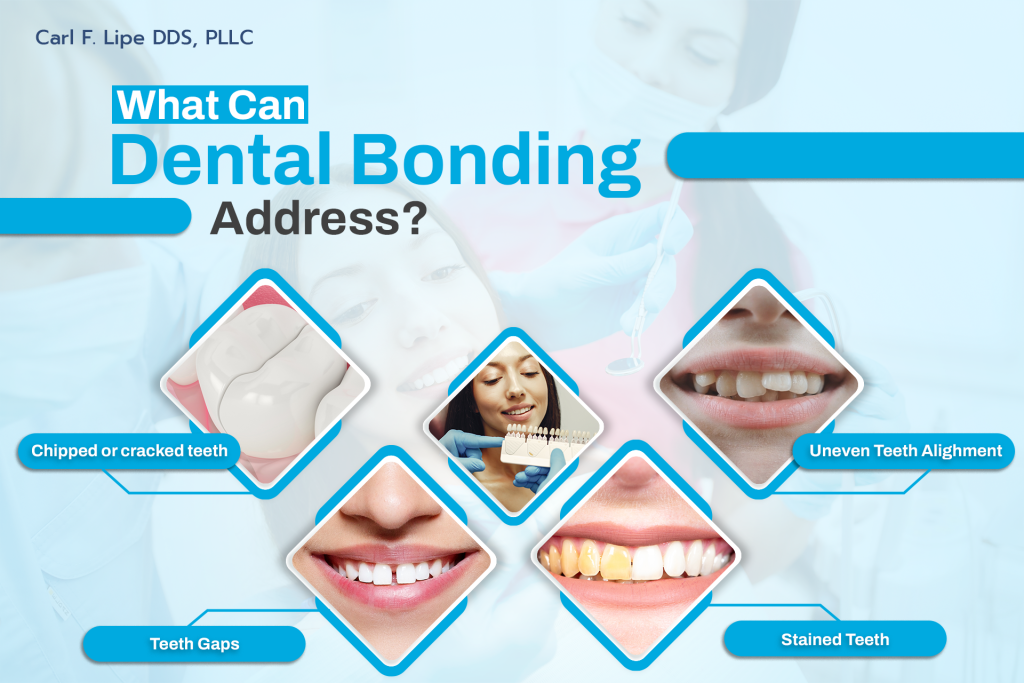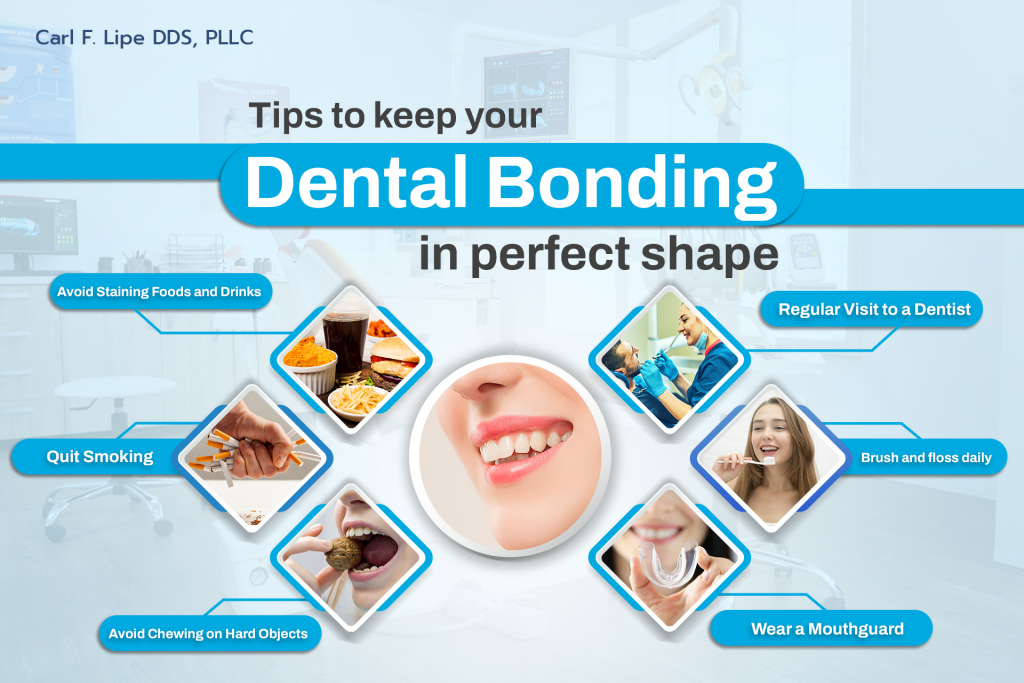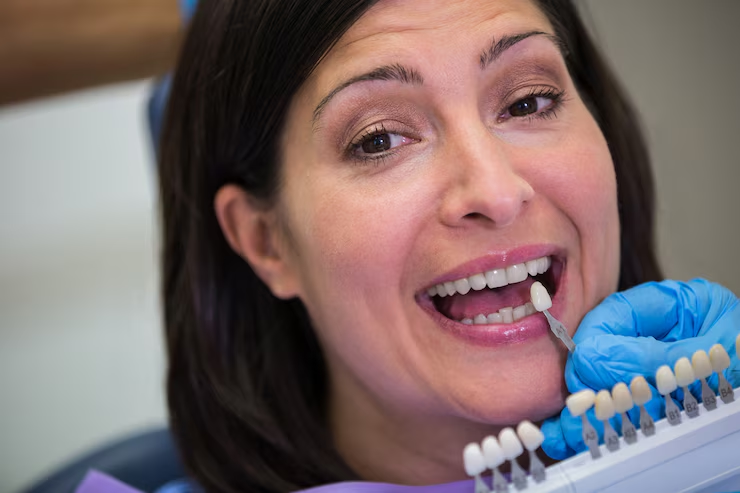Cosmetic dental bonding at Carl Lipe is perfect for fixing gaps, chips, and discoloration. Achieve a brighter smile. Call (720) 594-4583 for free consultation! Same day appointment also available.
Dental bonding procedure is used to repair and restore teeth that are crooked, chipped, or discolored. It involves the application of a composite resin to the affected area, which is then hardened using a laser. Compared to other dental cosmetic procedures, dental bonding is an affordable and quick fix that takes less than 60 minutes
Why choose Carl F. Lipe DDS, PLLC for cosmetic dental bonding in Denver?
- Dr. Carl F. Lipe DDS, PLLC has years of experience specializing in cosmetic dental bonding, ensuring high-quality results.
- At Dr. Carl F. Lipe we use the latest advancements in dental technology and techniques for precise and effective cosmetic bonding.
- We offer personalized treatment plans, tailored to each patient’s unique needs and desires for their smile.
- At Dr. Carl F. Lipe we provide a comfortable and welcoming environment, ensuring your comfort and satisfaction throughout the bonding procedure. We also offer Dental Bridges , Cosmetic Dentistry , Denture Solution , Dental implants , Full Mouth Reconstruction , Painless Tooth Extraction , Dental Crown and more.
Clinic Tour Video
What can cosmetic dental bonding address?

You can have dental bonding as a cosmetic repair for your tooth. From mild to moderate, dental bonding can fix a lot of aesthetic issues, including:
- Gaps between teeth
- Minor crookedness
- Unevenly sized teeth
- Tooth discoloration resistant to tooth whitening
- Small chips
- Shallow cracks
Benefits of Dental Bonding
- Enhanced Appearance: Dental bonding can improve your teeth’s appearance by fixing chips, cracks, discoloration, and gaps, which can lead to the appearance of a beautiful smile.
- Minimally Invasive: The procedure requires minimal or no removal of the enamel on your teeth, making it a more invasive choice compared to other methods.
- Easy and Painless: Dental bonding is often completed in one visit without the requirement for anesthesia, making it an easy and painless procedure.
- Cost-effective: When compared to other dental cosmetic procedures, such as crowns or veneers, dental bonding is affordable, which makes it accessible to many patients.
- Multi-purpose Application: Dental bonding may be used to make a variety of functional and cosmetic enhancements that include filling in cavities, reshaping teeth, and securing exposed roots.
Are You a good candidate for tooth bonding?
You could be a suitable candidate for tooth bonding when you’re dealing with minor cosmetic problems. You may have a tooth that is decayed, discolored, or has an uneven size.
The most important thing to consider is that dental bonding is not cosmetic, and in the event of a major decayed or broken tooth, it cannot be fixed with dental bonding.
Tips to keep your Dental Bonding in perfect shape

- Maintain excellent oral hygiene: Brush your teeth at least two times a day with a soft-bristle toothbrush and fluoride toothpaste. Floss regularly to eliminate food particles and plaque from your teeth. This can prevent decay and staining around the bonded area.
- Avoid staining foods and beverages: Limit your consumption of beverages and foods that could stain your dental bonding, such as tea, coffee, red wine, berries, and sauces. If you drink them, wash your mouth in water and floss your teeth following the meal to reduce the staining.
- Avoid hard foods and habits: Avoid biting down on hard foods such as hard candies, ice, and nuts and practices like chewing on a pen or opening packages using your teeth. These actions could bond the material to a crack or chip.
- Regular dental checkups: Visit your dentist frequently for cleanings and checkups. Your dentist will check the health of the dental bonding, polish it to eliminate the stains, and perform any repairs needed to ensure it looks the best.
- Use mouthguards for protection: If you play sports or grind your teeth in the evening, you should wear a mouthguard to protect your bonding from damage. A mouthguard can also help protect your teeth from injuries due to trauma or grinding.
- Avoid tobacco products: Smoking or using other tobacco products can significantly discolor and stain dental bonding. Beware of these products to maintain the appearance and health of your bonded teeth.
The Advantages & Disadvantages Of Tooth Bonding
| Advantages of Tooth Bonding | Disadvantages of Tooth Bonding |
| Bonding can improve the appearance of chipped, discolored, or misaligned teeth, enhancing your smile. | Bonding materials can pick up stains from food, drinks, and smoking, requiring regular maintenance. |
| The procedure is usually done in one visit, often without the need for anesthesia, making it convenient and comfortable. | Bonding materials are not as strong as natural teeth and may chip or break under excessive pressure. |
| Minimal alteration of the natural tooth structure is needed, making it a more conservative option compared to veneers or crowns. | Bonding typically lasts 5-10 years, after which it may need repair or replacement. |
| Affordable Option: Generally more cost-effective than alternatives like veneers, making it accessible for many patients. | Color Matching Challenges: Achieving a perfect match to the natural tooth color can be difficult, especially over time as natural teeth age and change. |
| Versatile Uses: Besides cosmetic purposes, bonding can also be used to fill small cavities, repair cracks, and close gaps between teeth. | Not Suitable for Large Restorations: Bonding is best for minor cosmetic changes or small repairs; for larger restorations, other options may be more appropriate. |
FAQ
What is cosmectic dental bonding?
Dental bonding is a cosmetic procedure that includes a tooth-colored resin material to be applied and hardened to fix the appearance of a tooth.
How much does dental bonding cost?
The cost of dental bonding typically ranges from $200 to $1000 per tooth, depending on the complexity of the procedure and your location. Visit our clinic for adequate discount plans and effective service.
Who needs teeth bonding?
People with stained, chipped, cracked, or discolored teeth are more likely to be candidates for dental bonding. Closing the gaps between teeth or making minor adjustments in tooth shape or length, this process is a cost-effective solution for all cosmetic improvements to their smile without the need for extensive dental work.
Is cosmetic dental bonding covered by insurance?
Dental bonding can be covered by a variety of insurance plans. However, it typically depends on whether the dental bonding is considered functional or cosmetic.
How long does dental bonding last?
Typically, the materials of dental bonding last anywhere from 3 to 10 years, depending on the location of the bonding, your daily oral habits, and how well you take care of your teeth.
Does dental bonding hurt?
The dental bonding process is usually painless and doesn’t require anesthesia unless a decayed tooth is to be filled.
How long does dental bonding take?
It usually takes about 30 to 60 minutes per tooth to complete.
Is cosmetic dental bonding permanent?
No, it is not permanent. Wear and tear over the years may require touch-ups or replacements.
Can it be removed?
Yes, it can be removed or replaced by a dentist if needed.
Can dental bonding be whitened?
No, dental bonding material cannot be whitened. If you want to whiten your teeth, it’s best to do so before getting bonding done.
Does dental bonding damage teeth?
Cosmetic dental bonding does not damage teeth when properly applied and maintained. It is a minimally invasive procedure.
Can teeth bonding fix gaps?
Yes, cosmetic dental bonding can fix the smaller gaps between teeth.
Can it straighten teeth?
Dental bonding can be used to make minor corrections in tooth alignment, but it cannot replace the services of other orthodontic treatments like braces or Invisalign for significant misalignment.
Can you get dental bonding with braces?
Yes, getting cosmetic dental bonding with braces is possible, but it is usually recommended to complete orthodontic treatments first.
Does it look natural?
Yes, dental bonding looks very natural when performed by an experienced dentist, as the resin is matched to the color of your teeth.
Does it protect teeth?
It can protect teeth by covering and sealing minor cracks or chips, but it is not as strong as a crown or veneer.
Does dental bonding stain?
it can stain over time, especially if exposed to coffee, tea, tobacco, and other staining substances.
Is it better than veneers?
Dental bonding is a more conservative and less expensive option compared to veneers, but veneers are more durable and stain-resistant.
How to clean dental bonding?
You can take care of it in the same manner that you take care of your natural teeth: brush and floss twice a day, and schedule routine cleanings and examinations at the dentist.
What is dental bonding material?
Dental bonding material is a type of composite resin, which is a durable plastic material that can be shaped and polished to match the surrounding teeth.
Can I still drink coffee after dental bonding?
Yes, you can but it is better to drink coffee and other drinks after a few days from the dental bonding to prevent the minimal chances of staining.
Can you get implants after dental bonding?
Yes, you can have dental implants after dental bonding if needed.
Can you use toothpaste on dental bonding?
Yes, non-abrasive toothpaste can be used to avoid scratching the bonded area.
